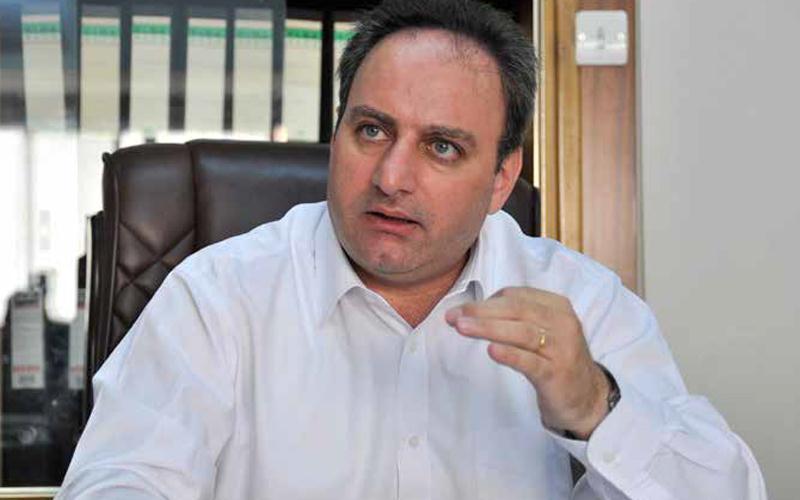
Interview with Stefanos Stefanou, AKEL Political Bureau member “The President should be in favor of resuming negotiations in the way Mr. Guterres sets out”
Sunday 29th November 2020, ‘Haravgi’ newspaper
Given the behavior of Turkey and Erdogan, do you think the hoped for result of the UN Secretary-General’s effort beginning with Ms. Lutte’s arrival will be fruitful?
SS: The UN Secretary-General’s call is for the resumption of negotiations on the agreed basis of bi-zonal, bi-communal federation with political equality and from the point where they had remained at Crans Montana on the basis of Mr. Guterres’ Framework, safeguarding the convergences achieved. The UN Secretary General’s Special envoy on Cyprus Mrs. Lutte will apparently sound out the involved parties on their intentions. We do not know whether Mrs. Lutte’s effort will yield results. This will depend on the content of the positions of her interlocutors.
Do you think that the Greek Cypriot side has convinced the UN Secretary General that it is seeking the resumption of talks from the point where they had remained at Crans Montana?
SS: If the Greek Cypriot side had convinced him, more than three years wouldn’t have gone by without any negotiation procedure. The Greek Cypriot side will convince the UN Secretary General if it clearly, without any ambiguity and preconditions, accepts the resumption of negotiations from the point and in the way that Mr. Guterres says.
It is a fact that during the three-year now absence of negotiations, Mr. Anastasiades failed to convince the Secretary General that he is ready to proceed with the negotiations. This is not our own arbitrary conclusion. The Secretary General notes this in the repeated Reports he has submitted. Mr. Anastasiades was not convincing, because at the same time as he was declaring that he was ready for the resumption of negotiations, he proposed “new ideas”, which annulled significant convergences, which the UN Secretary General wants to preserve. The contradictions and mutual annulments of the President undermined his credibility vis-a-Vis the UN Secretary General, but also more broadly among the international community.
We hope that now we are at the last critical point of the Cyprus problem the President will act in a different way, namely that he is clearly and concretely in favor of the resumption of negotiations in the way that Mr. Guterres suggests. Only then will he convince.
What is the minimum result you expect from the five-party conference and what is the maximum?
SS: What would be unfortunate is that the continuation of negotiations would not be agreed upon because of the different perceptions of the parties involved on how negotiation will proceed. The maximum would be the resumption of negotiations, as the UN Secretary General states. Let’s hope it will be the second.
Will the possible submission of a proposal by the Turkish and Turkish Cypriot sides for a two-state solution torpedo everything or force the Greek Cypriot side into a discussion on new ideas?
SS: No one can force us to move away from our positions when these positions are in line with the decisions of the UN. The agreed basis for a solution of bi-communal, bi-zonal federation with political equality, as described in the relevant resolutions of the International Organization, has been adopted in numerous resolutions and constitutes the official position of the UN itself.
The International Organization will not move away from its official positions – unless requested by both sides. Even if the Turkish side insists on another basis for a solution, the UN will remain on the position of bi-zonal, bi-communal federation, as long as we are consistent and steadfast in our commitment to it. In such a case, it is most likely that we will not have a resumption of negotiations, but by doing that the Turkish side will be exposed and the responsibilities will be assigned on it for the continuation of the deadlock.
This development will of course not be desirable, but it is of great importance for the handling of the Cyprus problem on the day after and for addressing Turkey’s efforts to create new fait accompli.
Centralized or decentralized federation and why?
SS: We (the President and government) should have asked ourselves this question when we began the negotiation to know how many and what competences we would be asserting for the federal government. It is competences that determine whether federation is decentralized or not. The issue of competences has essentially been agreed in the negotiations. The President of the Republic wrongly decided afterwards to open this issue too and, in fact, without ever clarifying which of the agreed competences he is ready to delegate to the constituent entities. There are competences that if conceded, we will not have a federation but a confederation which means two separate states.
Is political equality, according to the resolutions of the UN Security Council, finally agreed or negotiable?
SS: The content of political equality is indeed defined by a series of resolutions of the UN. Political equality means, among other things, effective participation in the institutions and decisions of the central government. In the many years this subject has been discussed, what effective participation means exactly was specified and in essence up to the Crans Montana conference, it had been agreed. This fact is noted by the UN Secretary General himself in the Report he had submitted in September 2017. Therefore political equality is agreed and if the President of the Republic does really wants the continuation of the negotiations, then he must accept what was agreed and not continue to open the issue.




